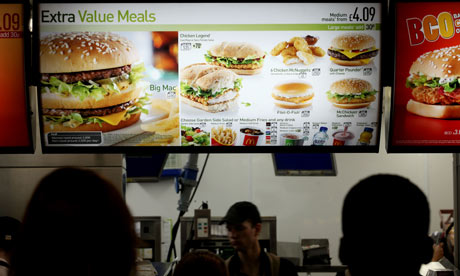
The announcement by McDonald's this week that it will put calorie labels on its products in all its UK restaurants gave Andrew Lansley, the health secretary, something to boast about. It was no doubt a welcome distraction from the accusations that his health and social care bill threatens to hand our National Health Service over to the private sector.
It gave McDonald's a burst of positive publicity too. No mention that the fast food giant's enthusiasm for one part of Lansley's new "responsibility deal" on public health does not extend to another of the deal's voluntary pledges, to cut salt in products. Like many other food and drink industry participants in the deal, it has not agreed to sign up to the bits of responsibility it finds more awkward. Without salt most fast food wouldn't taste of much. Typhoo, meanwhile, has signed up to the pledge to remove trans fats from its tea. Tea, in case you are wondering, does not contain fat, trans or otherwise.
The way the tobacco industry used corporate social responsibility initiatives as a bridgehead into government has been documented. Once it had gained access it could influence policy to its own ends and use its CSR efforts as PR. The food and drink industries have not even had to force their way in. Lansley invited them to help write health policy, believing that voluntary agreements with big business are the way to tackle the obesity crisis and other diet-related disease.
The coalition government has chosen to cast public health as a matter of personal responsibility. It takes the classical liberal view that individuals should make their own choices, free from state intrusion. Nudging us to healthier choices is OK, but regulating is not.
On this liberal reading, the fact that your risk of being obese relates closely to your socio-economic status is not a question of social justice but a problem of the feckless poor being too ignorant or spineless to make good choices.
This is a dangerous misrepresentation. It conflates the right of the individual to freedom from interference with the right of business to the same freedom from government constraint. It ignores the fact that business intrudes on our choices constantly with its powerful marketing and sales strategies.
It refuses to acknowledge that industry's interests – to maximise consumption and profits – are in direct conflict with public health needs. We need them to sell less of their junk foods and alcoholic drinks. They need us to keep buying them. Most troubling of all, it abrogates the proper role of the state in protecting the vulnerable and addressing problems that threaten to become overwhelming collective burdens. Given that most habits are acquired young, why is industry still free to target children with marketing for junk food during prime time TV and through social media? If as the Foresight report found, the burden of obesity and diet-related disease is likely to cost the UK £50bn by 2050, when does collective good outweigh the right of the individual?
The current crisis of public health is not in any case about the collapse of personal responsibility but a reflection of a toxic environment in which making healthy choices has become increasingly difficult, particularly if you are on a tight budget or work long hours. There is a surfeit of energy-dense but nutrient-light food, much of it produced with state agricultural subsidies.
Contrast the coalition approach to the stark message from the medical journal the Lancet, which has just published a major expert series on obesity. "The conclusions are unambiguous. We need collaborative societal changes in many aspects of our environment to avoid the morbid consequences of overweight and obesity." Most health experts now agree. No single intervention will work in isolation. A whole range of measures is needed that cross government departments, on transport, food, drink, working hours and advertising restrictions. And yet so far all that is on offer are these deals, and, just as with the NHS, a devolution of ministerial responsibility, in this case to local authorities.
The government does not even have the fig leaf of a scientific basis for its approach. The House of Lords science and technology select committee report on the behaviour change theories favoured by the Conservatives found there was no evidence that "nudges" work. It concluded that the responsibility-deal pledges on obesity were not a proportionate response to the problem's scale.
Voluntary deals are "the refuge of scoundrels". If Justin King, the chief executive of Sainsbury's, can thus describe them to the select committee, it's surely time even this pro-business government acknowledged just how woefully inadequate they are too.

